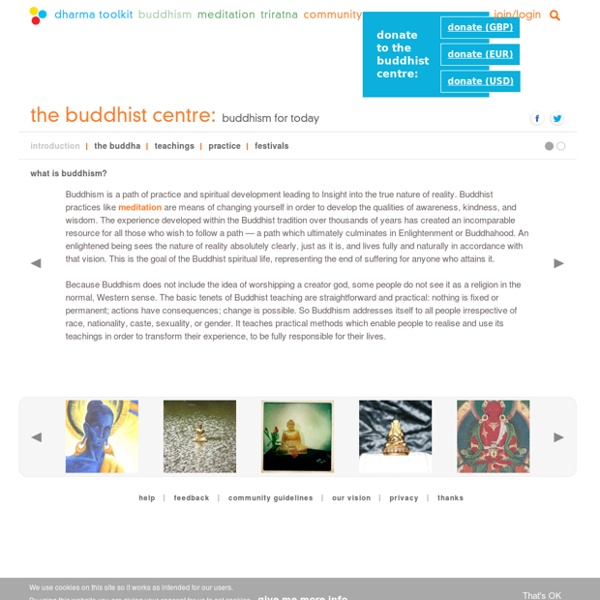



https://thebuddhistcentre.com/buddhism
Related: Worldviews (Yr 11 RE) • Buddhism • BuddhismWhat Is a Worldview? by James Sire [Editor's Note: The following is adapted from the introduction of James Sire's book The Universe Next Door, Fifth Edition. Used by permission of InterVarsity Press PO Box 1400 Downers Grove, IL 60515. Few people have anything approaching an articulate philosophy—at least as epitomized by the great philosophers. Even fewer, I suspect, have a carefully constructed theology. But everyone has a worldview. HuffPost is now a part of Verizon Media HuffPost is part of Verizon Media. We and our partners will store and/or access information on your device through the use of cookies and similar technologies, to display personalised ads and content, for ad and content measurement, audience insights and product development. Your personal data that may be used Information about your device and internet connection, including your IP address Browsing and search activity while using Verizon Media websites and apps Precise location Find out more about how we use your information in our Privacy Policy and Cookie Policy.
Buddhism Buddhism is a non-theistic religion (no belief in a creator god), also considered a philosophy and a moral discipline, originating in India in the 6th and 5th centuries BCE. It was founded by the sage Siddhartha Gautama (the Buddha l. c. 563 - c. 483 BCE) who, according to legend, had been a Hindu prince before abandoning his position and wealth to become a spiritual ascetic and, finally, an enlightened being who taught others the means by which they could escape samsara, the cycle of suffering, rebirth, and death. The Buddha developed the belief system at a time when India was in the midst of significant religious and philosophical reform. Buddhism was, initially, only one of many schools of thought which developed in response to what was perceived as the failure of orthodox Hinduism to address the needs of the people.
What is 'New Age' Religion, and Why Can't Christians Get on Board? -Spiritual Living, Christian Faith If you haven't run into it before, it would be hard to avoid it now. Oprah's rolling out the red carpet for the New Age: a weekly online class with New York Times bestselling guru Eckhart Tolle and a daily broadcast with Marianne Williamson, whose Course in Miracles was beckoning seekers thirty years ago when I was tripping through the wonderland of discovering my own divinity and wielding the powers of the universe to create my own reality. Ah, but I didn’t know Jesus back then – that is, I didn't know him as the Son of God. I knew him only through my guru, who taught that Jesus was a great spiritual master and who blended quotes from the New Testament with quotes from the Bhagavad-Gita to produce a spiritual foundation for people like me – too hip, too cool, too sophisticated to tie themselves to the narrow-minded thinking of Christianity.
How American Buddhism is Like an Elephant To understand Buddhism in the United States, it helps to start with an ancient Buddhist story. A group of blind men describe an elephant. One, who feels the elephant’s tail, describes it as a rope. "Buddhism and Relationships" by Susan Piver « "Sky-Gazing Meditation" By Lama Surya Das | "If the Buddha Used Twitter" by Soren Gordhamer » 1 March 2010 Buddhism has much to teach on the topic relationships, even though it may not seem that way at first. I mean what do the four noble truths (life is suffering; suffering is caused by attachment; it’s possible to stop suffering; there is an 8-fold path for doing so) have to do with figuring out how to love someone—or how to survive when someone stops loving you? Well, as a student of Buddhism and one who writes about relationships, I can tell you that every time I’ve tried to contextualize a Buddhist teaching as a way of understanding love, it works. So not too long ago, I thought about the four noble truths and the three yanas in connection with that which we long for and fear the most: love.
The New Age Movement- What Is It? This article first appeared in the Summer 1985 issue of Forward, currently the Christian Research Journal. The full PDF can be viewed by clicking here. For further information or to subscribe to the Christian Research Journal go to: What is the New Age movement? Evidence of a new phase in evolution? Harbinger of the Antichrist? The Buddhist Perspective on Human Fulfillment: The Pure Land by Alfred Bloom, Emeritus Professor, University of Hawaii Every major religion of salvation has a vision of paradise, the destination of the faithful. In the early tradition of Buddhism the goal was inconceivable Nirvana. Nirvana as a term meant to blow out, that is, blowing out or extinction of the winds of passions, delusion and greed; transcendence of karma. It was not a place to go, but more a state of being or condition beyond description or conception.
The Effects Of Buddhism In The Society - Buddhism Zone Every religion always impacted positively or negatively to any society. And, it does this through its teachings. However, Buddhism is merely a way of life and, it does not include the concept of God.